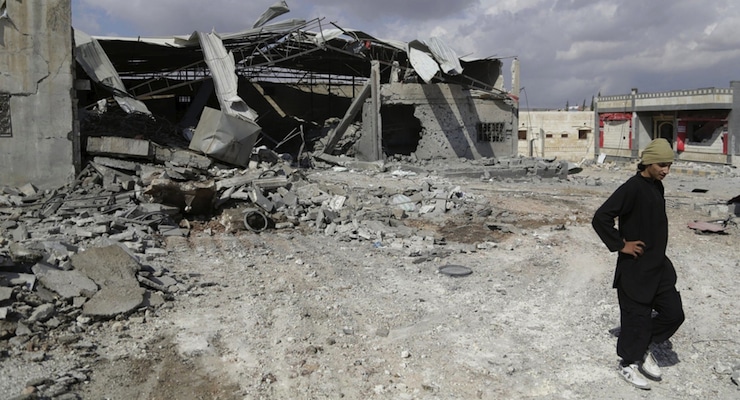

A site in the Syrian town of Babila that were reportedly hit by Russian airstrikes on Wednesday. (Photo: Khalil Ashawi/Reuters)
The U.S. State Department suspended negotiations with Russia aimed at ending the violence in Syria, blaming Russian and Syrian attacks on civilian targets. The failed bilateral talks follow previous failed attempts at a ceasefire, which broke down in mid-September after President Bashar al-Assad bombed rebel-controlled neighborhoods.
“This is not a decision that was taken lightly,” State Department spokesman John Kirby said in the statement. “The United States spared no effort in negotiating and attempting to implement an arrangement with Russia aimed at reducing violence, providing unhindered humanitarian access, and degrading terrorist organizations operating in Syria.
“Unfortunately, Russia failed to live up to its own commitments.”
While viewed by the Obama administration as a violation of the terms of the ceasefire, the attack came shortly after the Obama Administration expressed “regret” for an airstrike targeting Islamic State (ISIS) militants that mistakenly killed Syrian military forces. The White House was awaiting a response from the Russian-backed Syrian president, whose military called the strike a “serious and blatant attack on Syria and its military” and “firm proof of the U.S. support of Daesh and other terrorist groups.”
Daesh is the Arabic acronym for ISIS, whom the military said was able to take a hill overlooking an air base because of the U.S. airstrike.
Following the airstrike, the U.S. military suspended its air campaign against the ISIS terror group in eastern Syria and CENTCOM officials said the U.S. military was “certain” about the outcome of the strike and had been watching al-Assad’s forces “for a few days” believing they were ISIS militants. But Russian President Vladimir Putin in mid-September called into question the U.S. commitment and ability to the recent cease-fire.
He said that the White House wasn’t prepared to break with “terrorist elements” opposing President Assad’s forces.
In response to the State Department, President Putin deployed an advanced anti-missile system to Syria for the first time. The SA-23 Gladiator anti-missile and anti-aircraft system, which has a maximum effective range of roughly 150 miles, arrived in Syria last weekend “on the docks” of a Russian naval base along Syria’s Mediterranean coastal city of Tartus.
The move serves as the latest indication that Moscow intends to increase its military supporting of President Bashar al-Assad in Syria against the U.S.-backed rebels.
Russian Foreign Ministry said Monday that the U.S. has “done all it could to destroy the atmosphere encouraging cooperation.”
“We would like to bring Washington back to understanding that it can’t introduce sanctions against us in areas where it’s quite painless for the Americans, and at the same time continue selective cooperation in areas it sees as advantageous,” it said.
Worth noting, the war on the ground is also a war for hearts and minds, an effort which the Obama administration has damaged severely.
In July, a U.S. air strike in Syria killed more than 85 civilians, including children, but that was as they were fleeing from ISIS. The UK-based Syrian Observatory for Human Rights said the airstrikes appear to have been a case of mistaken identity, with the U.S.-led coalition misidentifying them as ISIS militants. Nevertheless, the U.S. airstrikes accidentally came down on roughly eight families in the ISIS-controlled village of Tokhar, which is near Manbij in northern Syria.
Scores of ISIS fighters are still defending the city and are keeping thousands of civilians from leaving, using them as human shields.







Dan Shive / October 3, 2016
BO will handle it!
/
deplorable-harambe / October 3, 2016
@Ricky_Vaughn99 @PPDNews good
/
Smarf Durden, HWA? / October 3, 2016
@Ricky_Vaughn99 @PPDNews our diplomacy game is SHIT!
/